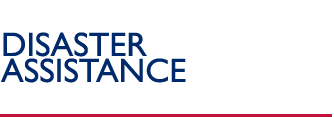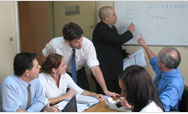 |
|
 |
 |
|
 |
 |
 |
No training is scheduled at this time. Please continue to check this page for future training announcements.
For more information contact ofdaworkshops@usaid.gov.
|
|
 |
 |
|
 |
 |
|
 |
 |
|
How Can I Help?
Humanitarian Organizations Working in the Disaster Region
The most efficient and effective way to help those affected by a disaster overseas is to make a monetary donation to a humanitarian organization that is implementing relief programs in the affected region. There are several different ways to go about identifying such organizations:
- USAID may have a list on its website. Check USAID's home page to see if the particular disaster is listed. If it is, click on the link, and then look for the "How Can I Help?" box.
- The Center for International Disaster Information (CIDI) will often have links to various lists of organizations that are responding to a disaster.
- InterAction, an association of non-profit humanitarian organizations, may have a list of responding members on its website. Check InterAction Members Respond: How You Can Help to see if the particular disaster is listed.
- Global Giving may have specific disaster-recovery projects listed that can be supported.
- Other organizations that may also have information on responding organizations include The Better Business Bureau's Wise Giving Alliance, The American Institute of Philanthropy, GuideStar, and Charity Navigator.
- News and search engine websites sometimes have lists of responding organizations. Check CNN, MSN, Google, Yahoo, or the website of your local newspaper or television station.
- The United Nations maintains a website called ReliefWeb, which is a repository of information, listed by disaster, submitted by responding humanitarian organizations.
Selecting a Humanitarian Organization to Support
There may be many organizations accepting donations for a particular disaster. Selecting which one to support is an important part of the donating process.
Monetary Donations
Monetary donations are the most effective form of assistance
because they allow humanitarian organizations to purchase
(often within the affected region itself) the exact type and
quantity of items needed by those affected by the crisis.
Read about the advantages
of monetary donations…
Commodity Contributions
While monetary donations are preferred to commodity contributions,
there may be rare instances when a commodity contribution
would be of value to relief operations.
- See a list of conditions
which are necessary to ensure that a commodity contribution
is appropriate…
- Read about handling
appropriate commodity contributions…
- If a commodity collection has already been made, but there
are problems identifying a need in the affected region for
the commodities or an organization to accept them, read
about some alternate
ideas…
Drug Donations
According to the World Health Organization (WHO), donated drugs are often inappropriate for the emergency to which they are sent or level of care available. They may also be unfamiliar to local health-care professionals and may not comply with local policies. And they may even be dangerous. For more information, see WHO's Guidelines for Drug Donations and drugdonations.org.
A Donations Message from the Humanitarian Community
View a message
from the humanitarian community about the best way you can
help those affected by an overseas disaster...
Volunteering
Volunteer opportunities in disaster settings are extremely rare, and are usually limited to people with prior disaster experience and technical skills (such as health, engineering, etc). To register your skills and experience for a possible volunteer opportunity, go to the Center for International Disaster Information's registration page. For opportunities to volunteer overseas in non-disaster settings, visit USA Freedom Corps. Or read about Volunteers for Prosperity, a volunteer program managed by USAID. For more information on volunteering, visit InterAction.
For More Information
For more information on donations, see the following:
Sale of Commodities or Transportation Services
All humanitarian commodities and services procured by USAID are carefully selected, in coordination with the affected countries and other humanitarian organizations, for maximum benefit to disaster-affected populations. Read about the sale of commodities or transportation services.
Back to Top ^
|


